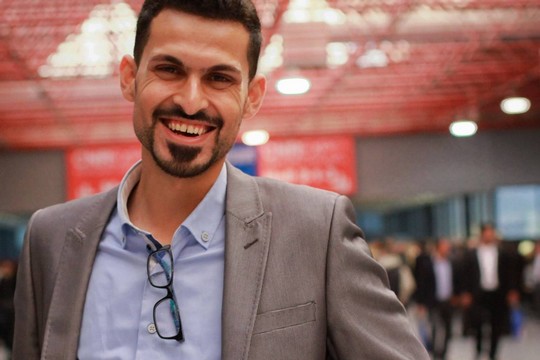Israel’s military rule over its Palestinian citizens may have ended in 1966, but the long arm of the Shin Bet and the police continues to meddle in our private affairs. I know from personal experience.
By Yaser Abu Areesha

“What did you do?!” yelled my mother, God rest her soul, with a mix of fear and anger.
I was 23 years old and the year was 2009. She called close to midnight as I made my way toward my home in Jaffa’s Ajami neighborhood, following a long day of work. I tried to calm her down and understand what she wanted. “You have been summoned for interrogation by the police,” she told me.
I was shocked. My body froze as I felt the fear seep into me, causing my knees to nearly buckle. I regained my composure, trying to stay on the line with her. And while I was fairly certain that I did nothing to merit an interrogation, I was still frightened. Along with the fear, however, I was curious how my name reached the police, and all this during my first days as a student.
I calmed down my mother and explained that I would be home the following day. I tried to maintain my cool, telling her that there must be some misunderstanding, and that even if the police did want to speak to me — I had done nothing wrong. My mother did not agree that I would stay the night in Jaffa, so I headed north to my hometown of Fureidis — leaving me feeling even more helpless. I had to see the summons with my own eyes, hoping to find in it even the slightest explanation or piece of information. But when I arrived I discovered that this was the full message that awaited me:
Summons for interrogation: You are hereby summonsed for questioning at the Zichron Ya’akov police station.
Just like that, without details: simply head over to the station. And Arabs, as Majd Kayyal (who underwent a Shin Bet interrogation following a trip to Lebanon) once said, do not ask the regime “why.”
Pleased to meet you
The following day I headed over to the police station, where I was met by an elderly, exhausted duty officer. “Your summons does not appear in our system, please go to the Hadera police station.” Her response astounded me; while I was stressing out and losing sleep, the duty officer is acting as if everything was business as usual. My protestations didn’t seem to move her. “It says here you own a red SEAT.” Her patience was running thin as she nicely explained that I would have to drive 20 minutes south to Hadera.
The next day I arrived at the Hadera station at noon. I went to the duty officer, who looked strikingly similar to the woman from Zichron Ya’akov. She asked that I wait. Half an hour went by until a tall, red-headed man came over, stop before me and smiled.
“Hello, I’m Sarig,” he said in Arabic, with a Palestinian accent that raised my suspicions. “Making acquaintance between people and doing away with anonymity is part of the teachings of the prophet,” he declaimed as he reached out to shake my hand. Sarig presented himself as “head of the Fureidis and Jisr A-Zarqa areas in the Shin Bet security service’s Arabic division. “Come with me,” he said, and we made our way inside a maze of cells, walking toward the unknown.
In my head I began playing out scenarios of an interrogation room with a single dangling light bulb. “He’ll probably offer me a cigarette,” I told myself. At the end of the journey we reached a room with a computer and two leather sofas. “Tfadal, rest,” Sarig said to me with a kind expression. “What is the purpose of my visit to you, Sarig?” I asked. He leaned on the sofa and smiled. “We’d love to get to know you.” To meet me! The regime and the security forces are interested in getting to know me. Well, pleased to meet you.
Very quickly the conversation turned to small, invasive details about my life: I spoke about my friends, about my relationships with friends that he knew by name, about my family and my plans for the future. For someone who just wanted to “get to know me,” it seems that Sarig knew quite a bit about me. Even a lot. Looking back, I still don’t know what the goal of that meeting was, though my guess is that it was probably a combination of instilling fear, deterrence, or perhaps even checking to see whether I could be recruited into the Shin Bet. Of course, there is no way to be sure — the ways of the Shin Bet are a mystery.
A political arrest
The arrest of my friend Anas Abudaabes last week reminded me of my unpleasant interaction with the Shin Bet. Of course there is no comparison between my “friendly chat” with Sarig and Anas’ arrest — which included interrogations, holding cells, court hearings, and now house arrest. But the body that carried out my chat and Anas’ detention is the same, and its name is the State of Israel.

One may even assume that it’s not even the entirety of the State of Israel, only the part that is an expert on Arab issues. After all, in Israel there exist two parallel worlds of law and order: a Jewish-Zionist regime with democratic characteristics for one group, and a military regime over Israel’s Palestinian citizens, which ostensibly ended in 1966, yet in effect continues to stretch the long arm of the Shin Bet and the police deep into the daily affairs of the indigenous minority. This is the part of the regime intended for Arabs and those who oppose it, among others. This is the same part that arrested Anas and summonsed me for interrogation.
Anas Abudaabes, who was born — for no fault of his own — Palestinian, was interrogated and jailed by the second regime. What Anas wrote on Facebook, when he harshly criticized those who celebrated the fires that erupted last week across Israel, included not one bit of incitement. Anas is a decent man on principles — he is humane and works tirelessly to make this place better for everyone. But someone jumped on the opportunity. Someone wanted Anas on the inside, to silence and stop him in his tracks. To turn a man of truth, peace, and justice into a belligerent saboteur.
On paper it appeared that Anas was arrested for a post he published on his Facebook page, but I tend to believe that this is but the tip of the iceberg. Those who accused the police of ignorance — of not understanding Arabic or satire — are simply wrong. Anas’ arrest was political, one that was meant to justify the incitement against Arabs that we heard as the fires burned.
Even after the flames died down, the incitement that raged could not be put out by a Supertanker. The police were finally given a proper translation of Anas’ status, but their ego was still bruised. Thus came the decision to transfer his case to the state attorney.
Anas has thousands of followers on Facebook. and the fact is that whenever he publishes an interview or an op-ed, it often in good taste, including against shameless leaders who exploit the Palestinians or the rest of the Arab world. Anas has a penchant for the Arabic language, which he promotes through a number of projects in which he is involved. Considering Anas’ status as a person of influence, whose opinions have a wide effect, it is may just be that Anas’ arrest was entirely political.
I would love to end by expressing a hope for change, but it seems that there is nothing but pessimism. As long as there will be no civil awakening that will protest against the injustices of our “democracy,” the residents of this land will continue to face more anti-democratic treatment from the state. This will include violence, restrictions on freedom of speech, and severely curtailing our civil liberties.
But perhaps there is one glimmer of home. At the end of my conversation with Sarig, he said he would be happy to hear from me, and that he is available for anything I need. “I have just one request,” I told him. “Yes?” he asked. I stared at Sarig as I shook his hand: “Tell your informers that I sold that red SEAT long ago.”
Yaser Abu Areesha is a student at Tel Aviv University. This article was first published in Hebrew on Local Call. Read it here.

